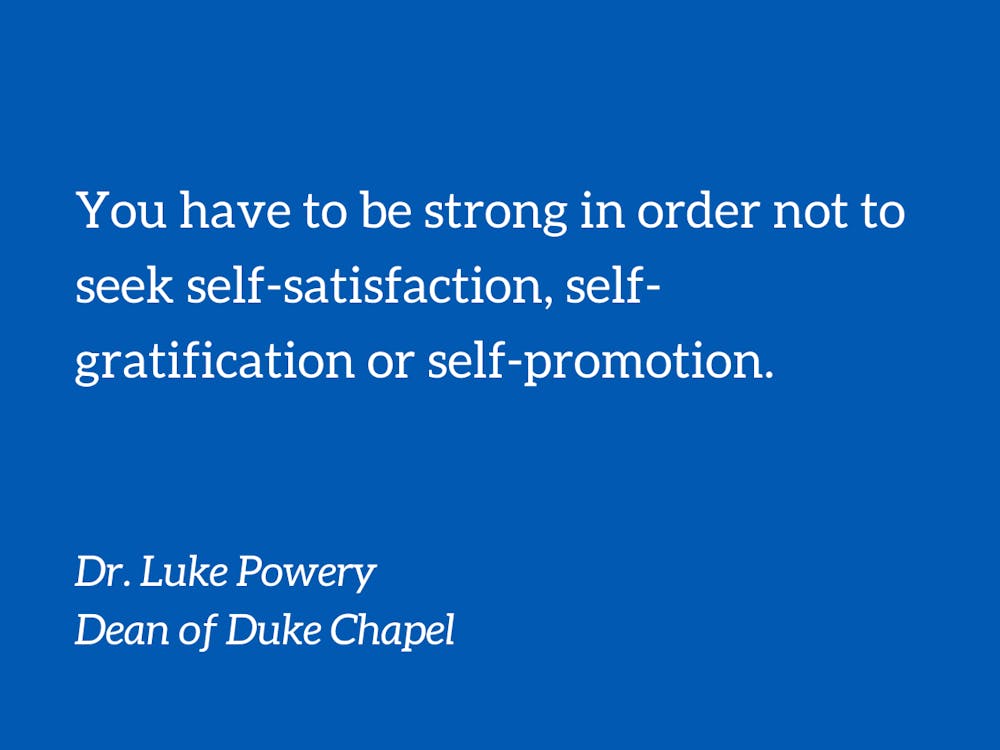There is an unsung virtue that is on life support in Duke Hospital, and we have to decide whether to pull the plug on it or not. We may think its best days are over and it’s no longer needed in the land of Blue Devils; it’s a virtue that I’m sure every Duke student did not emphasize to get accepted into Duke. And do you know what that virtue is? Humility.
No one gets into Duke or any other educational institution by being humble. On the contrary, college applications prime the pump for hubris: “I led this. I created this. I won this. Look at me, admissions committee. I’m special. Choose me and you won’t regret it!” We might even be so bold as to channel Beyoncé and sing, "We run the world”!
Sometimes the interdisciplinary conversations on campus are about making a difference in the world, or even beyond that, changing the world. “We’re going to change the world”: now that’s a humble statement if I ever heard one. Maybe the truth, though, is that we are going to be changed by engaging with the world and others in it. Perhaps it’s not just about being change agents but being willing to be changed ourselves. It may not be that we are the ones to teach and shape and lead; maybe we are the ones who need to learn and follow. Divinity School professor and colleague Jerusha Neal recently said that even the “learned can learn.” That means we are all students, including faculty and staff, not just those who are the literal Duke students. We are all learners in the school of life.
And there are many lessons to learn around breakfast, lunch and dinner tables. One ancient parable, found in the Gospel of Luke, gives two lessons about humility. The first is to guests—when you’re invited to a wedding banquet, go and sit down at the lowest place. The tag line is “For all who exalt themselves will be humbled, and those who humble themselves will be exalted."
If you want to rise, go low. Many people think that humility is a sign of weakness, when it is actually a sign of strength: you have to be strong in order not to seek self-satisfaction, self-gratification or self-promotion. You have to be strong to choose humility, to choose that which is low, and not seek better financial returns on your investments year after year. You have to be strong in order to make room at the table for others who might have a better seat than you, when you could have been in their chair. You have to be strong not to hoard all of the banquet blessings for yourselves.
The second lesson from the parable is to hosts—when you throw a dinner party, invite the poor, the crippled, the lame, and the blind, not your friends or brothers or relatives or rich neighbors, so that you don’t get invited in return or repaid in any way. In other words, invite the outcasts, those whose humanity has been diminished because of economics or health or social isolation.
Do not feast on people without power but feast with them. Host them because they, too, are human—in Latin, humus, which means ‘from the earth,’ the ground, dirt and dust. Humility is a virtue that hosts others into your heart and the soil of your life. Humility makes space at banquet tables for those who are different. Why? Because humility says, “you are human too, created in the image of God, and I can learn from you, even though you don’t look like me or act like me or think like me.”
Humility will say in a Duke classroom, “I welcome your perspectives and viewpoints from business or law or science or public policy or engineering or divinity or the arts or any other discipline, or from your background and family history. You are welcome because your story and insights matter.”
Have you ever considered that the poor, the lame, the homeless, the prisoner, even a Carolina Tarheel might have something to teach us? Humility is a virtue that hosts others and desires nothing in return; it is not concerned with a certain network or net worth. Humility challenges what Yale professor Carolyn Sharp calls the “calculated reciprocity” in social interactions. Humility says, through the practice of hosting, that you have worth even if the Roman or American empire says otherwise.
At times, we are guests, and other times, we are hosts. But we are always students, lifelong learners. Comedian Phyllis Diller taught the antidote to hubris. She said, “You know what keeps me humble? Mirrors!” In other words, see yourself for who you truly are—very small real estate in the vast world. Therefore, true hospitality extends a world-wide welcome beyond our clannish tribalism or self-interests. It embodies the poem “The New Colossus” by Emma Lazarus, which is inscribed on the base of the Statue of Liberty:
"Give me your tired, your poor, Your huddled masses yearning to breathe free,
The wretched refuse of your teeming shore. Send these, the homeless, tempest-tost to me…”
Who will you welcome to the table this academic year, inside and outside the classroom? I know that humility is undervalued in our society, but that’s what it will take to truly learn this year. There’s so much hubris going around in the public square and on Twitter. But let this be the year your humility hosts someone else and makes room for them as your teacher.
Who knows? As ancient scriptural wisdom teaches, the stranger you meet may be an angel for you.
The Rev. Dr. Luke A. Powery is Dean of Duke University Chapel. His column runs on alternate Mondays.
Get The Chronicle straight to your inbox
Signup for our weekly newsletter. Cancel at any time.

